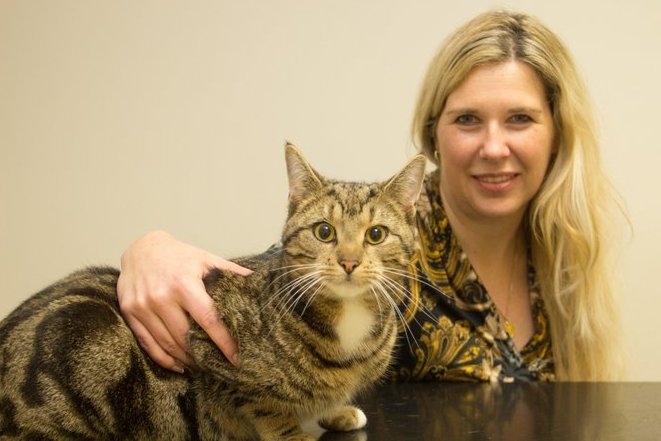
Cara has always been concerned about the environment; she has a doctorate in Environmental Science and Engineering, and has worked on a wide range of environmental issues in Ireland, from water quality to renewable energy. She has had particular concerns about the impact of meat and dairy production on the environment, due to the production of greenhouse gases by farm animals.
This month, January, has been dubbed “Veganuary”, with many people trying a vegan lifestyle for a month. As a member of Friends of the Earth, Cara already eats a low meat diet: just as driving the car less can help the environment, so can eating less meat.
A decade ago, animal welfare was the main reason that people chose to be vegan; these days many people cite health reasons, and like Cara, many others stop eating meat because of concern for the environment.
Cara’s cat, Sushi, had an accident last week. She stood on a sharp object, and lacerated one of the toes on her back left leg. I had to take her in for the day for a small operation to repair the wound. Sushi went home with a large bandage on her leg but I expect her injury to heal well.
could sushi become vegan?
When Cara came to collect Sushi, she used the occasion to ask me a few questions about her pet’s diet. Cara knew that cats were carnivores, and she feeds Sushi with dry pellet biscuits containing meat. She wanted to know if, with recent advances in nutritional science, it might be possible to feed her on a vegan diet, with the necessary nutrients artificially manufactured and included in vegan kibble biscuits?
Cats are more complicated than dogs when it comes to their nutritional needs. Dogs are omnivores who have evolved with the ability to digest plant-based starch. All of a dog’s nutritional needs can easily be provided by non-meat sources. Studies have shown that dogs can thrive on a properly balanced meat free diet, and it’s now possible to buy vegetarian or vegan dry dog kibble. With care, dogs can safely become vegan pets.
Cats, in contrast, are obligate carnivores, which means that they need to have specific nutrients that are only found in meat. Their anatomical structure – their teeth and digestive tract – and their metabolism have evolved for processing meals derived solely from small prey. In the wild, that’s what cats eat, and that’s what their bodies have adapted to need. Modern pet foods include a high percentage of meat, repackaged into a biscuit formulation. Pet cats no longer eat small prey as their main source of nutrition, but they still eat a high level of animal protein, and for health reasons, they need to continue to do this.
It’s relatively simple for cats to adapt to eating and digesting some plant-based food but the problem is that there are some critical aspects of the feline metabolism that have an absolute need for nutrients that are only commonly found in meat.
First, cats need to have two specific meat-sourced amino acids, the building blocks of protein.
The first of these is called taurine: if they don’t get this, serious illness follows, including fatal heart disease. It is possible to source taurine by creating it artificially in the laboratory, but if it’s not included in cats’ diet, they will become extremely ill. The easiest option, by far, is just to feed them a meat based diet.
The second essential amino acid is arginine, which is common in meat, but which can also be found in specific plant sources. Arginine is needed to metabolise ammonia in the body; signs of ammonia toxicity develop within hours if a cat is fed on a diet deficient in arginine. While cats fed on a meat based diet are guaranteed to consume sufficient arginine, there’s a risk of deficiency if the wrong type of plant based diet is given.
Cats also have specific needs for other meat-sourced nutrients, including specific essential oils and vitamins. Synthetic supplements are available, but they must be given in the correct quantities.
With care, it is possible to artificially create a vegan diet for cats, and these are available on the market now. However pet nutrition experts will continue to be cautious about these until extensive feeding trials have been carried out to prove that they can keep cats healthy into the long term.
Even if a suitable non-meat diet has been identified, steps must be taken to ensure that cats stay healthy. Urine should be tested once a month, to ensure that it is sufficiently acidic: plant based diets cause alkaline urine, which tends to lead to crystals and stones, causing dangerous urinary tract obstructions especially in male cats. Also, a twice yearly visit to the vet is needed for a full physical examination to check for signs of nutrient excess or deficiency, which may include the need for blood tests.
Some vets have described vegetarian or vegan cats that are stunted, prematurely aged and clearly not healthy, while others say they’ve seen cats on meat free diets that are thriving.
Cats are born and bred to be meat eaters. Cara doesn’t want to take any chances with Sushi’s health, so she’s decided that for now, at least, she’ll carry on feeding her standard cat foods.




Please note that I am unable to answer veterinary questions in comments. If you have questions or concerns about your pet's health it is always better to contact your vet.